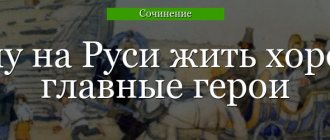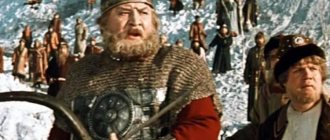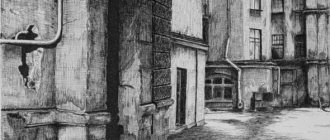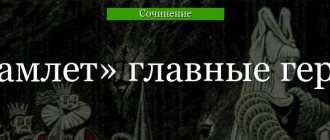- Essays
- On literature
- Other
- Analysis of the tragedy of Prometheus chained by Aeschylus
History of creation
The tragedy was created in the middle of the 5th century BC. Aeschylus relied on the myth of Prometheus, who participated in the fight between the Olympians and the Titans. The action takes place after the overthrow of the old gods and the accession of Zeus to Olympus. These myths reflect a transitional period in people's minds. The Titans personified the forces of nature - majestic, powerful and soulless. And the gods are already similar to people themselves, have their own characters, and sometimes commit unseemly acts. This is a period of a person rethinking his place in this world. Aeschylus and his contemporaries reflect on the place of man in the divine hierarchy. They are the same as people, so why can't people also influence the lives of the gods?
The essence
A poem about one of the gods who went against his fellows to help people. Prometheus taught them to hunt, build houses, make clothes, heal with herbs and, in the end, brought them fire. By this he angered Zeus, for which he ordered him to be chained to a rock, because the gods are immortal and such execution means eternal torment. There was another reason: Prometheus, being a seer, knew about the fate of all the Olympians, including the supreme god, but refused to reveal this to him. The other gods do not understand Prometheus’s act, but at the end of the tragedy he reveals his main motive to the god Hermes, saying that it is better to suffer than to serve.
Genre
In tragedy, an extremely small role is assigned to the choir. Therefore, unlike other tragedies of Aeschylus, the oratorio genre is poorly represented here. The main place is given to monologues and dialogues, which allows the genre of recitation to open up.
The main characters and their characteristics
During the entire tragedy we see Prometheus on stage. He is present here as one who suffered for the good of people. The viewer cannot help but empathize with him. But in his monologues he does not blame anyone except fate, because Prometheus knew what was destined for him.
Hephaestus and Hermes act as executors of the will of Zeus. The only difference is that Hephaestus does this against his own desire; he obeys rather from the internal impossibility of betraying his ruler. And Hermes simply blindly follows the will of the gods.
The off-stage character Zeus is presented here in an atypical role. If in other tragedies Aeschylus glorifies him, presenting him as a wise and fair master, then here he appears as a tyrant and despot who does not take into account anyone’s opinion except his own.
Issues
There are clearly social issues in Prometheus Bound. Perhaps, in a metaphorical sense, Aeschylus wanted to show similar situations among people, when a tyrant ruler eradicates any dissent. And it is possible that there are also traces of man’s struggle with the gods, the transition from the era of the Olympians to the era of heroes, this is evidenced by the appearance of Io, from whose descendants Hercules would later be born.
What is the meaning of tragedy
Aeschylus wanted to convey that it is impossible to live in peace with oneself when injustice is happening around. When the rule of the Titans began to seem cruel, he opposed them with the gods, and when the gods themselves begin to oppress people, Prometheus again sides with the weak. According to the author, tyranny is senseless and destructive, and rulers who do not understand this themselves undermine their throne.
Calculate eloquence
It should be noted that no matter how abstract the concept of “eloquence” may seem, it turned out to be possible to accurately measure it. These are two parameters: the number of different words in the text (“vocabulary richness”) and the average frequency of each word (that is, the number of uses of each word in the text, divided by the number of its uses in the text corpus under consideration).
What do we mean by "words"
“Words” can be understood as very different objects.
To avoid getting bogged down in linguistic terminology, by “word” we mean the sequence of characters between punctuation marks (including spaces). That is, “ate” and “I am eating” are two different words, “we will eat” are two different words. Moreover, “linen” and “linen” are thus also two different words, so when analyzing it is necessary to standardize the spelling of the text. Share
Word frequency calculations show that Euripides was “more eloquent” in his later tragedies. For example, in “The Trojan Women,” a tragedy of the late middle period, the ratio of “vocabulary length” (the number of different words in the text) to the length of the text is 0.5, and in “Res” it is 0.51—that is, about the same. At the same time, in “The Trojan Women” there are 7398 words, and in “Res” - 5628. And if you take the average piece from “The Trojan Women” of the same length as the whole “Res”, then this metric will become 0.61.
But the “eloquence criterion” itself, although it allows you to finally take and calculate something, is not as good as it seems at first glance. The richness of the vocabulary and the sophistication of words strongly depend on the author's will. An author can fill one work (or a fragment of it) with pompous vocabulary, and, on the contrary, make another work more colloquial. In those days when it was not yet fashionable to count word frequencies, supporters of Euripides’ authorship fully agreed that in “Res” the playwright was “more eloquent,” but they gave this a different explanation than the skeptics: “Res,” in their opinion, refers to the early work of Euripides, when he still imitated his teachers, Sophocles and Aeschylus - and in his more mature years he developed his own style, less exalted than that of his older contemporaries. True, information about not a single production of “Res” has reached us, and therefore only indirect arguments speak in favor of an early dating.
It would seem that poetry studies should provide real scope for statistical research. Hundreds of lines written in different variations of the same meter (for tragedy this is primarily iambic trimeter and anapestic dimeter, analogues of Russian iambic hexameter and anapest tetrameter) should distinguish one author from another, because different authors should prefer different rhythmic variations.
For example, in Prometheus, out of 773 iambic trimeters, 12 begin with two short and one long syllables (1.55 percent), while in the rest of the tragedies of Aeschylus this figure ranges from 0.2 percent (in The Petitioners, where there is only 1 such line) to 0.8 percent (in Agamemnon, where there are 7 of them). But, firstly, this phenomenon itself is very rare. And secondly, in another tragedian, Sophocles, in Philoctetes, out of 1078 iambic lines, 17 have this property (1.58 percent), and in Electra - only 1 out of 1126 (0.09 percent). And this does not make anyone doubt that Electra and Philoctetes were written by the same author.
This is roughly the case with most poetry arguments. The same features of the verse that sharply distinguish Prometheus from the tragedies of Aeschylus - for example, a large proportion of catalectic (shortened) anapests in the actors' lines - are actually explained by the small total number of anapests, and, as a result, distorted statistics. Finally, the assertion that the verse features of a work that distinguish one author from another appear without the will of the author is extremely doubtful. To almost any argument of poetry scholars for or against this or that attribution, one can object that in this particular work the author decided to experiment with poetic meter.
“Prometheus Bound” (Aeschylus): description and analysis of the tragedy
“Prometheus Bound” is a tragedy included in the circle of works of Aeschylus and, apparently, constituted the second part of the trilogy (which also included the tragedies “Prometheus the Fire-Bearer” and “Prometheus Unbound”). There are still scientific disputes about the dating of the tragedy and even about its very attribution to Aeschylus, caused primarily by its content, where the confrontation of the titan Prometheus with Zeus is shown as a struggle with a certain divine tyrant, lording over other deities and hostile to the entire human race. At first glance, this atheistic pathos does not correspond to the picture of divine justice in other works of Aeschylus and forces researchers to associate the tragedy with the views of the “enlightenment of Greece” - sophistic scientists and attribute it to a later time. Indeed, the main theme of Prometheus’s speeches in the tragedy is suffering, and undeserved suffering. Complaints about these innocent torments frame his monologues, practically from his first words to his last. At the same time, he talks at length about his benefits to people and appears as a kind of intercessor for humanity; the humiliation of Prometheus, chained to a rock by order of Zeus, becomes a symbol of dependence and subordination of the entire human race.
The unconditional emphasis of the main character also determines the unusual structure of the tragedy, the main part of which consists of the mournful and angry speeches of Prometheus. Their background is the chorus of the Oceanids, the daughters of Ocean, who sympathize with the hero, the Ocean admonishing Prometheus, as well as the servants of Zeus opposing the titan - Power, who does not utter a single word, Strength, and finally Hermes. Prometheus’s confrontation with the servants of the supreme god is a stage manifestation of the main conflict of the tragedy, the peculiarity of which is that it manifests itself in the opposition of Prometheus, who is present on the stage, and Zeus, who is formally absent from it. It is characteristic that this conflict is conceptualized as an opposition between old and new deities, which makes us recall a similar dispute in the last tragedy of the Oresteia - “Eumenides”. Zeus appears as a “new” tyrannical ruler, whose arbitrariness is elevated to the rank of law. Prometheus, in turn, represents the ancient divine forces. But at one time, Prometheus himself helped put Zeus on the throne, giving him advice that allowed him to win the battle with the Titans. For the hero, this is a reason to accuse Zeus of ingratitude, however, the very fact that he acted as an ally of Zeus against his closest relatives marks the special character of both this character and his enmity with Zeus. In the tragedy “Prometheus Bound,” Prometheus sympathizes with other overthrown opponents of the king of the gods, and he also introduces into the work the theme of the curse of Zeus by Cronus, according to which Zeus, like his father, should be deprived of power by his own son. Thus, in “Chained Prometheus,” albeit on a different, “divine” level, there is a motif of a family curse, a series of mutual crimes of members of the same family, which constitutes the main conflict of other tragedies of Aeschylus, and Prometheus is a kind of “avenger” on behalf of the overthrown former generation, representatives of which in the tragedy are his passive allies of Prometheus - Ocean and his daughters.
But at the same time, in his confrontation with Zeus, Prometheus in many ways turns out to be closely connected with his opponent. They are connected in the past - by their alliance against the Titans. In the tragedy itself, their connection is emphasized by similar characteristics: both of them are stern, adamant, proud and furious, and the same epithets are applicable to them. Finally, they are connected by the future - a secret known to Prometheus: it depends on it whether the supreme god will retain his power. Prometheus, it would seem, predicts the inevitability of the fall of this power and rejects for himself the opportunity to open the future to Zeus in exchange for liberation. But he also claims the opposite: his enemy will find out the truth if he frees and rewards Prometheus, moderates his anger and again seeks an alliance. Prometheus almost completely reveals the secret, saying that Zeus will die from an unhappy marriage, he does not pronounce only the name of a possible wife, but names his own savior, who will come from the family of Io who came to Prometheus. The episode with Io becomes a kind of compositional one: the suffering of the girl, turned into a cow for the love with which Zeus was inflamed for her, and the madness that comes over her are similar to the torment of Prometheus himself. Zeus is to blame for her bitter fate, but at the same time the hero himself predicts that Io will be delivered from suffering by Zeus, just as salvation will come to Prometheus himself from Hercules, a descendant of Io and the son of the supreme god. Then Prometheus will finally reveal to Zeus the name of the woman forbidden to him - Thetis - and thereby retain his power. The next part of the trilogy after “Prometheus Bound”, “Prometheus Unbound,” was devoted to these events.
Thus, Zeus and Prometheus turn out to be allies in the past and future, enemies in the present. The power of Zeus, against which the hero of the tragedy seems to rebel, rests on the knowledge of Prometheus, and Prometheus’s salvation comes from Zeus. Their connection is determined by “inevitable fate”, the prediction of which becomes the main power of Prometheus, understood as the power of his knowledge (the name Prometheus itself means “knowing in advance, provident”). But this knowledge in many ways turns out to be in vain, because it cannot save Prometheus himself from the suffering.
Thus, the interpretation of the central image and plot of the tragedy “Prometheus Bound” by Aeschylus as a whole turns out to be dual, and the hero’s emphasized opposition to the supreme god is dictated by the place of this tragedy within the reconstructed trilogy. It is no coincidence that in antiquity we encounter a reduced image of Prometheus the deceiver, harming the gods (for example, in Aristophanes and Lucian). The theme of the destructiveness of Prometheus' gifts also arose, in particular, in Horace and Propertius. At the same time, the influence of Aeschylus's plot on subsequent tradition is determined largely by the image of the main character, perceived as a symbol of suffering in the name of humanity and as the personification of knowledge. The church fathers identify Prometheus with God and the prophets (Tertullian, Augustine). Subsequently, the idea of knowledge and creative search, personified by Prometheus, gradually comes to the fore (D. Boccaccio; Calderon - “Statue of Prometheus”, 1669-1674), popular in the Age of Enlightenment (J.J. Rousseau, Voltaire; I.-V. Goethe - “Prometheus”, 1773) and continued by the literature of romanticism (P. Shelley, “Prometheus Unchained”, 1819). The result of a certain godless interpretation of the hero was the phrase of F. Nietzsche, who saw in the protest of the hero Aeschylus a “hymn to godlessness.” “Negative self-determination of a titanic creature” expresses the image of Prometheus in the tragedy of the same name by V.I. Ivanova (1919). The theme of reason and rationality in the interpretation of the image of Prometheus was continued by the philosophical and aesthetic thought of the 20th century (A. Gide, A. Camus).
Source: Encyclopedia of Literary Works / Ed. S.V. Stakhorsky. - M.: VAGRIUS, 1998






